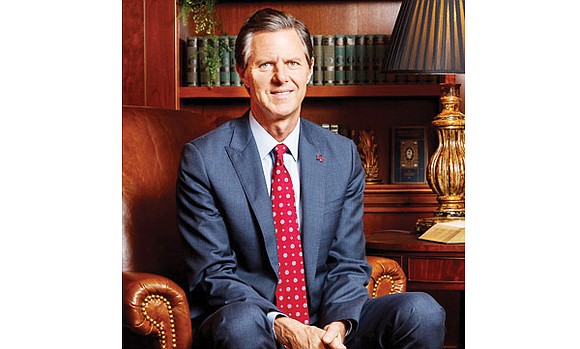Liberty president censors student newspaper over critics
Religion News Service | 4/13/2018, 9:07 a.m.
Religion News Service
LYNCHBURG
Liberty University President Jerry Falwell Jr. stifled an effort by the school’s newspaper to report on an event last weekend organized by his critics, said a student editor.
That event featured speakers critical of Mr. Falwell, in particular his outspoken support for President Trump, for whom he serves as a faith adviser.
Erin Covey, an assistant news editor at the Liberty Champion and a junior at the university, said she wanted to write about the “Red Letter Revival” — a gathering of progressive evangelical Christians and others in Lynchburg to pray against “toxic evangelicalism” — because it was a large event that involved Liberty students. She said she pursued the story with the approval of her fellow editors, including the Champion editor-in-chief and a faculty adviser.
The two-day event off campus in the university town concluded April 7, and drew speakers such as author Shane Claiborne and the Rev. William J. Barber II of North Carolina, who have challenged Mr. Falwell to a debate. One of the speakers, evangelical pastor and author Jonathan Martin, was removed from Liberty’s campus by police in October after attending a concert there days after calling for a peaceful protest of the school.
Ms. Covey said she reached out to Mr. Falwell on April 5 for comment because a representative from the progressive evangelical group Red Letter Christians, which facilitated the event, mentioned the university’s president during an interview for the story she planned to write.
“Obviously this was something that we knew (Mr. Falwell) would either want to comment on, or at least, definitely, review it before publication because it’s going to mention him,” she said last Friday.
But Ms. Covey said that after she contacted Mr. Falwell via email, he responded by instructing her not to write the story. A screenshot of his email was shown to Religion News Service. It said: “No let’s not run any articles about the event. That’s all these folks are here for — publicity. Best to ignore them.”
Ms. Covey said she responded with another email, arguing that national publications would likely cover the event and asking if the student paper could still cover the event and include his input. Mr. Falwell, she said, did not reply.
Other Liberty students who saw the email from Mr. Falwell corroborated Ms. Covey’s account but didn’t want to be identified for fear of the consequences. Mr. Falwell and other Liberty officials did not respond to requests for comment.
Asked if she considers Mr. Falwell’s alleged actions censorship, Ms. Covey said yes.
“I do think that currently the level of oversight we have does make it difficult to pursue the accurate journalism that we’re taught in classes,” said the 20-year-old editor, who is pursuing a degree in journalism at Liberty, one of the largest evangelical universities in the nation.
“We’re taught to be unbiased, to pursue both sides of the story, to show both sides fairly. But sometimes, when it comes to these controversial topics that we cover at the Champion, we know we can’t do that.”
Asked why she chose to come forward with her story, Ms. Covey said it was partly because discontent has been “building up” after “direct oversight” from administrators increased during and since the 2016 election cycle.
She said the intervention over the Red Letter Revival constituted “the only time where we were told directly by President Falwell, ‘Don’t cover this’ in advance.”
Ms. Covey acknowledged that it is “fairly common” to send administrators or faculty articles in which they are mentioned before they are published by the paper, and that sometimes stories are pulled by administrators.
“We are a private university, so the paper is owned by the university, basically,” she said, adding that some level of oversight is “understandable.”
But Ms. Covey described more invasive oversight as sometimes frustrating, saying, “It puts the Champion in a position where it’s more a PR vehicle for the university than a newspaper.”
She questioned whether student journalists at other universities grapple with the sort of intervention from college administrators that Liberty student journalists have come to expect.
“We often wonder: Do other private schools deal with this? What are the levels of freedom that other school papers have? Do we have the same freedoms — is this common?”
Jeremy Littau, associate professor of journalism at Lehigh University, said the kind of behavior attributed to Mr. Falwell is more prevalent at private schools than public universities.
“It’s more common at conservative Christian schools,” said Mr. Littau, a graduate of Biola University, a Christian college. He suggested that the tension may be a byproduct of conservative evangelicalism, which he said “does not have a strong culture of speaking truth to power outside of a biblical issues context.”
“I don’t think conservative Christianity has a good relationship with journalism. … I think you’ve got now two generations of evangelical Christians who really don’t know what the role of the press is,” Mr. Littau said.
He later added: “Liberty has the right, legally, to do what they’re (allegedly) doing here, but that doesn’t make it right.”







